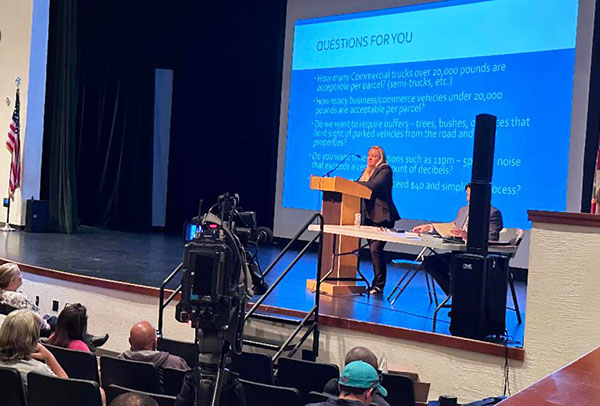Palm Beach County Commissioner Sara Baxter said Wednesday, March 22 that she’s ready to fight to loosen restrictions on big-rig, at-home parking for truckers in the 65,000 acres of Palm Beach County zoned agricultural residential, which includes The Acreage and most of the Indian Trail Improvement District.
“Truckers are an essential part of our economy,” said Baxter, whose sprawling District 6 includes much of the area in question. “They perform an essential service. They need to know they’re appreciated and supported… If we don’t provide a place for them to exist, we’re going to have a bigger problem than parking.”
Still, her support for the at-home parking is not unlimited, Baxter said, suggesting it should be restricted to one or two such vehicles.
Baxter’s comments came ahead of a Palm Beach County Commission Zoning Hearing scheduled for Thursday, March 23 at which Planning, Zoning & Building Department officials were scheduled to present the results of an internal investigation into alleged code enforcement abuses aimed at truckers.
“There have been no findings of inappropriate code violations related to commercial vehicle parking on residential lots,” Whitney Carroll, deputy director of Planning, Zoning & Building, wrote in a March 16 memo to commissioners.
Carroll noted that most of the complaints have come from The Acreage, which the memo described as “an antiquated AR [agricultural residential] subdivision.”
Baxter said Wednesday that she will continue to push for an outside look into the way code enforcement has handled the issue.
“An independent investigation could shed more light on the situation and give people more confidence in [the outcome],” she said.
The memo came one day after a town hall meeting hosted by Baxter at Seminole Ridge High School and attended by almost 300 people. Most rose to express their dissatisfaction with county code enforcers, who have been issuing citations for the parking of large commercial vehicles, such as tractor-trailer rigs, at their homes in areas zoned agricultural residential.
“There needs to be the same rules for everyone,” said Natalia Melian, an Acreage resident who has helped bring attention to the issue, after the meeting.
She added that code enforcers “don’t need to be going out harassing people.”
Many local truckers have to park their rigs in special lots as far away as Miami, Melian has explained in the past, even then trucks are often damaged and items stolen. Melian and her husband, Ricardo Alonso, own a trucking business and say that the ability to park their rig at their home was one of the main reasons they moved to The Acreage, but they might have to move again if the code can’t be clarified in favor of the truckers.
A handful of speakers shared their frustration with the truckers traveling residential Acreage streets not designed for use by tractor-trailer rigs. Pia Skoran, who started a petition against semi-truck parking in the area, also expressed concern that allowing them to do so would open the door for commercialization of neighborhoods.
“If we allow tractor-tailer parking, more will come,” Skoran said. “Many current residents will leave because they do not want a big-rig next door, then more trucks move in, and The Acreage becomes industrial.”
Baxter, an Acreage resident, said that the 100 or so big-rig trucks taken home by their drivers “are not what’s hurting our roads.”
Since 2017, there have been approximately 186 properties in the ITID area cited for code violations related to commercial vehicles, Carroll wrote, adding, “Although many of these violations have been resolved, a small percentage of these violations remain not in compliance.”
Those found in violation can be fined $150 to $1,000 a day. Baxter said Wednesday that she will push for a moratorium on the fines, which county attorneys now say is allowable.
What this all really comes down to is a “bad cut-and-paste job” when the county’s code was amended in 2008 and 2019, said Baxter, adding that prior to that time, “semi-tractors” were included in the definition of “commercial vehicles” allowed to park on properties of one acre or more that are zoned agricultural residential.
“The people who say [semi-trucks] were never allowed under the code — that is not correct. They’re simply wrong,” Baxter said. “Now we have to clean up the code because it now contradicts itself.”








